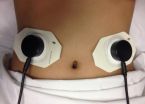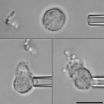(Press-News.org) Boston, MA (August, 2014) – Nearly a year after the 2013 Boston Marathon bombings, hospital staff, first responders and medical volunteers who cared for the injured and dying were still struggling to put the experience behind them, according to a Schwartz Center for Compassionate Healthcare report that describes eight confidential sessions held to help caregivers process their emotions and feelings in the aftermath of this horrific event.
The 90-minute Schwartz Center Rounds sessions – sponsored by the Schwartz Center in collaboration with the Conference of Boston Teaching Hospitals – allowed caregivers from multiple organizations and institutions to come together to share their experiences, post-bombing struggles, and coping strategies. Approximately 300 people attended at least one of the sessions, which were held at the six-month and one-year anniversaries of the bombings.
"Six months after the Marathon bombings, many attendees were still struggling with powerful feelings of guilt, anxiety, and isolation," said Schwartz Center Medical Director Beth Lown, MD, who facilitated two of the sessions. "By the later gatherings, some of these feelings had eased, but were being re-triggered by the upcoming anniversary and 2014 race."
The following were the dominant themes that emerged:
Guilt: Caregivers anguished over not having done enough at the scene, having been prevented from helping, not being trained in how to care for patients in a trauma situation, or leaving the area before the bombs exploded and opting not to return.
Isolation: While most caregivers said that their organizations, co-workers, friends and families were supportive of them in the aftermath of the bombings, a few spoke about a lack of support and understanding.
Collaboration and Teamwork: Many participants cited the superb collaboration and teamwork at the scene and in local emergency departments. Several people spoke about how that ethos had become institutionalized at their hospitals after the bombings.
Strength from the Survivors: The survivors were a huge source of healing for many of the caregivers. Some caregivers described developing friendships with people they cared for; others said they were proud that so many people had survived grievous injuries and returned to full lives. Many said the experience had also made them more compassionate caregivers. As one physical therapist put it, "We're closer to and more empathic to all of our patients now."
INFORMATION:
For a copy of the full report, please visit the Schwartz Center website at
http://www.theschwartzcenter.org/pageFiles/TDXJPVKKPUTMZ1H.pdf.
Boston Marathon bombing caregivers still grappling with tragedy one year later
Schwartz Center Rounds Sessions helped caregivers process their emotions
2014-08-08
ELSE PRESS RELEASES FROM THIS DATE:
Slowing brain functions linked to increased risk of stroke, death
2014-08-07
Cognitive abilities such as memory and attention are not only important after a stroke but also before; according to research published in the American Heart Association journal Stroke.
Previous studies have shown poor cardiovascular health can increase the risk of cognitive impairment such as problems in memory and learning. However, the opposite idea that cognitive impairment may impact cardiovascular health, specifically stroke, was not established before.
"Most clinical studies observe cognitive impairment after a stroke event, said Kumar Rajan, Ph.D., lead author ...
Neck manipulation may be associated with stroke
2014-08-07
Treatments involving neck manipulation may be associated with stroke, though it cannot be said with certainty that neck manipulation causes strokes, according to a new scientific statement published in the American Heart Association's journal Stroke.
Cervical artery dissection (CD) is a small tear in the layers of artery walls in the neck. It can result in ischemic stroke if a blood clot forms after a trivial or major trauma in the neck and later causes blockage of a blood vessel in the brain. Cervical artery dissection is an important cause of stroke in young and middle-aged ...
New treatment successful for the Mal de Debarquement Syndrome
2014-08-07
People who suffer from a rare illness, the Mal de Debarquement Syndrome (MdDS), now have a chance for full recovery thanks to treatment developed by researchers at the Icahn School of Medicine at Mount Sinai. Their findings were published online in the July issue of Frontiers in Neurology.
People often feel a sensation of movement, called Mal de Debarquement, after they have finished boating, surfing or a sea voyage. The symptoms usually disappear within hours, but in some people, and more frequently in women, symptoms can continue for months or years, causing fatigue, ...
Northwest Territories on fire and smoke drifts over Labrador Sea
2014-08-07
The fires on the shores of the Great Slave Lake in the Northwest Territories in Canada do not seem in any hurry to be extinguished. In this natural-color satellite image which was collected by the Moderate Resolution Imaging Spectroradiometer (MODIS) aboard the Aqua satellite on July 29, 2014 dozens of fires and copious amounts of smoke are evident. Actively burning areas, detected by MODIS's thermal bands, are outlined in red.
Click on the image above and an image of smoke drifting over the Labrador Sea appears. This smoke has risen off the fires in the Northwest Territories ...
Laparoscopic surgical removal of the gallbladder in pediatric patients is safe
2014-08-07
ROCHESTER, Minn. — A recent study conducted by Mayo Clinic researchers recommends laparoscopic cholecystectomies (surgical removal of the gallbladder) for pediatric patients suffering from gallstones and other gallbladder diseases. This study was published in Surgical Laparoscopy Endoscopy & Percutaneous Techniques.
MULTIMEDIA ALERT: Video and audio are available for download on the Mayo Clinic News Network.
A cholecystectomy is a surgical procedure performed to remove the gallbladder, a pear-shaped organ located below the liver on the upper right side of the abdomen. ...
New disposable biosensor may help physicians determine which patients can safely be fed following surgery
2014-08-07
A disposal, plastic listening device that attaches to the abdomen may help doctors definitively determine which post-operative patients should be fed and which should not, an invention that may improve outcomes, decrease healthcare costs and shorten hospital stays, according to a UCLA study.
Some patients who undergo surgery develop a condition called post-operative ileus (POI), a malfunction of the intestines. The condition causes patients to become ill if they eat too soon, which can lengthen an affected patient's hospital stay by two to three days. Until now, there ...
Team determines structure of a molecular machine that targets viral DNA for destruction
2014-08-07
BOZEMAN, Mont. – With a featured publication in the Aug. 7 issue of Science, Montana State University researchers have made a significant contribution to the understanding of a new field of DNA research, with the acronym CRISPR, that holds enormous promise for fighting infectious diseases and genetic disorders.
The MSU-led research provides the first detailed blueprint of a multi-subunit "molecular machinery" that bacteria use to detect and destroy invading viruses.
"We generally think of bacteria as making us sick, but rarely do we consider what happens when the ...
Expert insights on in vitro alternatives for drug and chemical toxicity testing
2014-08-07
New Rochelle, NY, August 7, 2014—In vitro toxicity testing is rapidly being adopted in the pharmaceutical, chemical, and cosmetics industries, for example, as an alternative to animal studies to predict adverse health effects of drugs and personal care products and the health consequences of environmental exposures. An insightful Roundtable Discussion focused on how to apply these novel toxicology models to everyday hazard prediction, risk assessment, and decision making in industry is published in the preview issue of the new journal Applied In Vitro Toxicology, a peer-reviewed ...
The typhoid fever pathogen uses a cloaking mechanism to evade neutrophil neutralization
2014-08-07
Typhoid fever is caused by systemic (body-wide) infection with Salmonella enterica Typhi. In contrast, infection with the closely related bacterium Salmonella enterica Thyphimurium is usually limited to the gut and causes less serious diarrheal disease. Research published on August 7th in PLOS Pathogens comparing the two pathogens reveals how S. Typhi avoids recognition and elimination by patrolling immune cells called neutrophils, allowing it to disseminate throughout the patient's body.
Neutrophils track down microbial invaders and gobble them up. To investigate why ...
Stanford researchers use fruit flies to unlock mysteries of human diabetes
2014-08-07
For the first time, the tiny fruit fly can be used to study how mutations associated with the development of diabetes affect the production and secretion of the vital hormone insulin.
The advance is due to a new technique devised by researchers at the Stanford University School of Medicine that allows scientists to measure insulin levels in the insects with extremely high sensitivity and reproducibility.
The experimental model is likely to transform the field of diabetes research by bringing the staggering power of fruit fly genetics, honed over 100 years of research, ...
LAST 30 PRESS RELEASES:
Husker researchers collaborate to explore fear of spiders
Mayo Clinic researchers discover hidden brain map that may improve epilepsy care
NYCST announces Round 2 Awards for space technology projects
How the Dobbs decision and abortion restrictions changed where medical students apply to residency programs
Microwave frying can help lower oil content for healthier French fries
In MS, wearable sensors may help identify people at risk of worsening disability
Study: Football associated with nearly one in five brain injuries in youth sports
Machine-learning immune-system analysis study may hold clues to personalized medicine
A promising potential therapeutic strategy for Rett syndrome
How time changes impact public sentiment in the U.S.
Analysis of charred food in pot reveals that prehistoric Europeans had surprisingly complex cuisines
As a whole, LGB+ workers in the NHS do not experience pay gaps compared to their heterosexual colleagues
How cocaine rewires the brain to drive relapse
Mosquito monitoring through sound - implications for AI species recognition
UCLA researchers engineer CAR-T cells to target hard-to-treat solid tumors
New study reveals asynchronous land–ocean responses to ancient ocean anoxia
Ctenophore research points to earlier origins of brain-like structures
Tibet ASγ experiment sheds new light on cosmic rays acceleration and propagation in Milky Way
AI-based liquid biopsy may detect liver fibrosis, cirrhosis and chronic disease signals
Hope for Rett syndrome: New research may unlock treatment pathway for rare disorder with no cure
How some skills become second nature
SFU study sheds light on clotting risks for female astronauts
UC Irvine chemists shed light on how age-related cataracts may begin
Machine learning reveals Raman signatures of liquid-like ion conduction in solid electrolytes
Children’s Hospital of Philadelphia researchers emphasize benefits and risks of generative AI at different stages of childhood development
Why conversation is more like a dance than an exchange of words
With Evo 2, AI can model and design the genetic code for all domains of life
Discovery of why only some early tumors survive could help catch and treat cancer at very earliest stages
Study reveals how gut bacteria and diet can reprogram fat to burn more energy
Mayo Clinic researchers link Parkinson's-related protein to faster Alzheimer's progression in women
[Press-News.org] Boston Marathon bombing caregivers still grappling with tragedy one year laterSchwartz Center Rounds Sessions helped caregivers process their emotions



